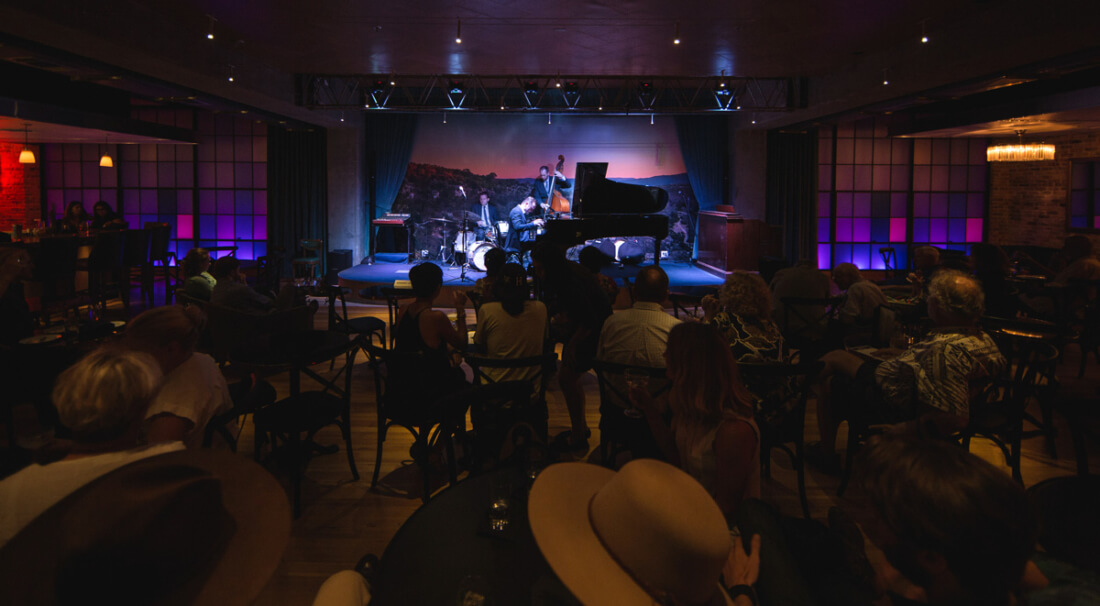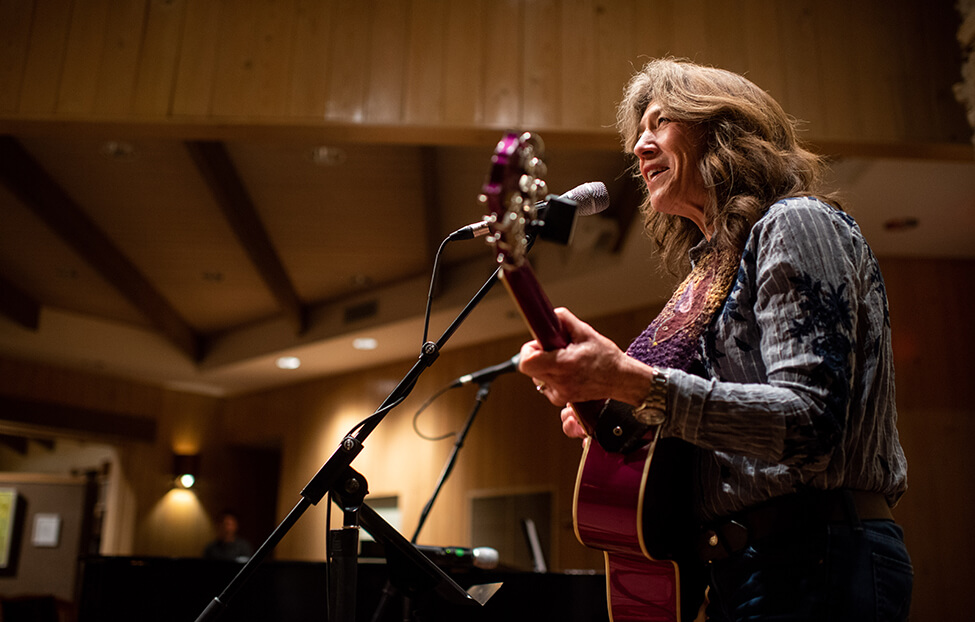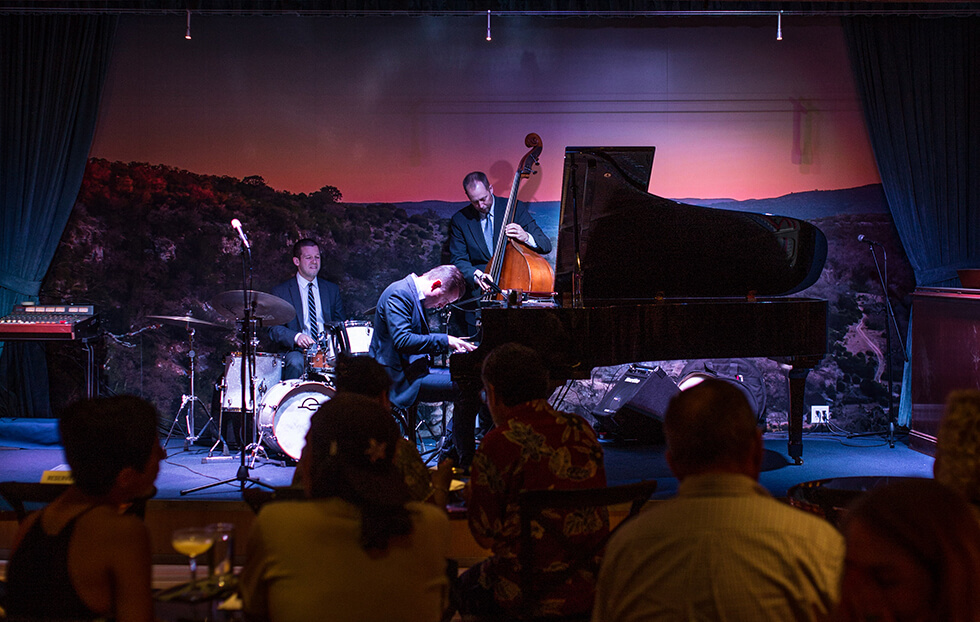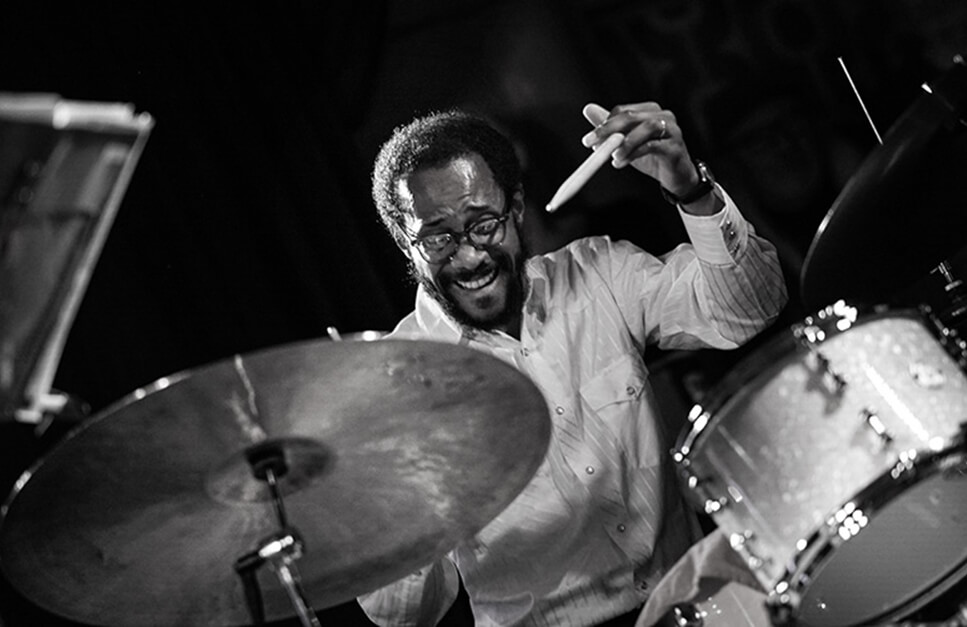
![]()
When music is the secret ingredient of transformation

It’s 1997, and no matter how many Grammys you have won, it’s hard not to be nervous when you are playing gospel rock at Laity Lodge and everyone has warned you that Mr. Butt is the fiercest defender of classical music and he owns the place and he’s Howard Edward Butt, Jr., for crying out loud, sitting there in that amazing double chair next to Barbara Dan.
“Whatever,” musician Ashley Cleveland remembered saying to herself. “This is who I am. If Howard doesn’t like it, he needs to know who I am.”
So she played “Riding with the King,” a song covered just two years earlier by B. B. King and Eric Clapton. After the final chord, Howard literally leapt from his chair and said, “It felt like I was on a rocket ship to the moon!”
Steven Purcell, the Lodge’s executive director, describes music as “the unsuspected secret
weapon in every retreat.” Music brings an element of surprise. It disrupts. Words and delicious meals and comfortable rooms are vital, says Steven, but music has this ability to startle a person and engage their imagination—really, their whole selves. At the Lodge, people literally feel the vibrations coming at them from the instruments.
Yet at the very first retreat in 1962, Elton Trueblood, a Quaker and one of Howard’s theological mentors, encouraged Howard Butt not to have music at retreats. No music at all. It’s hard to imagine.
Howard loved music, but he shared with Trueblood a concern that certain music might trigger associations with church. “When you have music, people [might] go into their church brain,” Howard explained years later. “You know, you use hymns and all of a sudden people quit using their brains, their minds.”
Laity Lodge was meant to encourage people to show up differently than they might in a church setting. Howard, who first confessed his struggles with clinical depression at the Lodge, wanted people to sit at the Lodge like they do on living room couches, not like they do on pews.
“They were telling their stories with honesty and transparency and vulnerability,” Steven
says, “and those things were not the culture of church on a Sunday morning at the time.”
Howard and Trueblood meant for the Lodge to exist at the intersection of experience and ideas. For this to work, guests would need constant reminders that they weren’t in church, and that they should be more actively engaged.
A few verses of “When I Survey the Wondrous Cross” could lull them back into passivity. But Howard loved that hymn. He loved music.

Performers Are Friends, Not Commodities
Laity Lodge—and perhaps Christianity itself—is not only about right ideas but also right relationships. Ideas are necessary, yes, and so are the dynamic, trusting communities in which we explore those ideas together. When we trust each other, we open ourselves to transformation.
This is what sets Laity Lodge apart, according to Brent Watkins, musician and owner of Jazz, TX, a popular music spot in San Antonio’s Pearl Brewery and home of Texas Public Radio’s “Live at Jazz, TX.” At the Lodge, music is “not just a transactional thing,” Watkins says. “They are inviting people to be a part of what they are doing out there.”
“We want a longer relationship with people,” says Gate Davis, director of program operations at the Lodge. “We don’t just contract musicians for a gig. We become friends.”
Sometimes, this looks like the musician Steuart Pincombe performing solo concerts at the Lodge, guests sitting across from him in a chair while he plays Bach on his cello in intimate one-on-one concerts. Sometimes, it looks like Cleveland and others setting down their instruments and engaging guests directly. Sometimes, it means the Lodge supports music and fellowship outside of the Canyon—hosting music-filled events in Los Angeles and Nashville, or even bringing concerts directly to local communities in Kerrville, Boerne, Leakey, and San Antonio.

Music and Fellowship Beyond the Great Hall
Since Jazz, Texas opened at the Pearl in 2016, Brent Watkins hasn’t had as much time to perform at Laity Lodge or engage with guests there. He has guests of his own to care for.
“I think about the Laity Lodge approach all the time,” he says. His club features an enormous photo of Leakey, Texas, plastering the wall behind his piano. The Lodge “has this grander vision of doing something great for art and culture … that isn’t only related to money or power.”
For years, Steven and Watkins had dreamt of bringing jazz legend Brian Blade to Texas, along with The Fellowship Band. Their performances are legendary.
The cost of such a concert would leave Jazz, TX with a shortfall, but Steven and Watkins agreed that they needed to make it happen. They were convinced that the performance would stretch the audience in a way that would open people up to growth and change. So they collaborated and shared the cost of getting the band to San Antonio.
And it was worth it. In late September, Brian Blade and The Fellowship Band, through Jazz, TX, helped San Antonio experience something transcendent, a night of fellowship between performers and audience.
“The Brian Blade concert was a landmark for us,” Watkins said. “We had high expectations going into it, and it’s one of the best shows I’ve ever seen. … Brian Blade is one of the best living artists of our day.”
Don’t believe it? Click here to hear them perform “Amazing Grace” at the Kennedy Center with Brian’s dad. Brian’s soft, eclectic rhythms just under the piano and vocals add something undefinable to the piece—a lightness and grace and humility.
The Fellowship is the name of Brian’s band for a reason. “God has given us this gift of the music, but [also] each other, to share,” he told John Gilbreath of KEXP in Seattle. “So when there’s a listener, when there is someone to receive all of your vulnerability and all of your hopes and all your open heart, it completes something. And the whole idea of the fellowship becomes an even bigger idea.”
Music and art provide a space for relationships that build trust between people. “One of the jobs of the artist,” says Watkins, “is to stretch the public and help them see things they couldn’t see before. If the arts aren’t stretching people, who is going to do it?”

Meanwhile, Back at the Lodge
From the beginning, Howard knew the Lodge would not lead people to transformation without stretching them. It would require powerful ideas. It would require personal stories. It would require the natural beauty of the Frio Canyon. And it would require music.
“Music connects with people,” says Steven, “on a visceral, embodied, incarnational, physical way that propositional statements alone do not.”
Elton Trueblood understood the power of music to the point that he discouraged having it at Laity Lodge. Howard Butt, though, hoped the Lodge could lean into that power. God could use music, he believed, and ideas and stories and beauty, to lead guests toward transformation.
And when transformation happens? It’s explosive. It’s powerful. It’s a little bit scary. You might be sitting on a couch, but it feels like you’re on a rocket ship to the moon.
Peek at the results of a survey we sent out and what your answers are telling us about the work ahead.